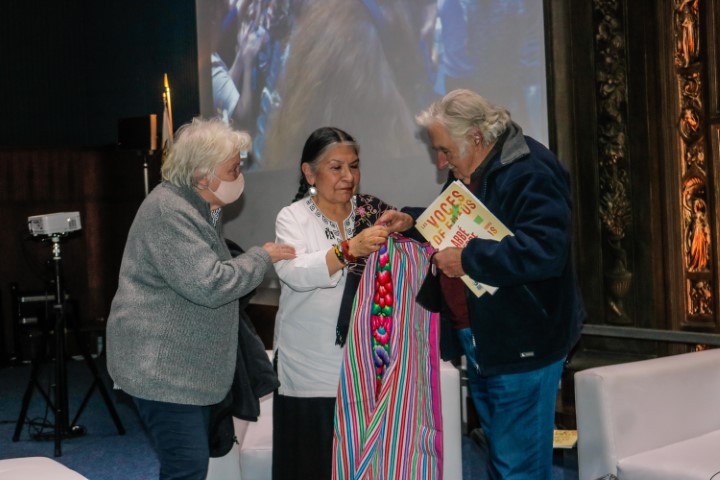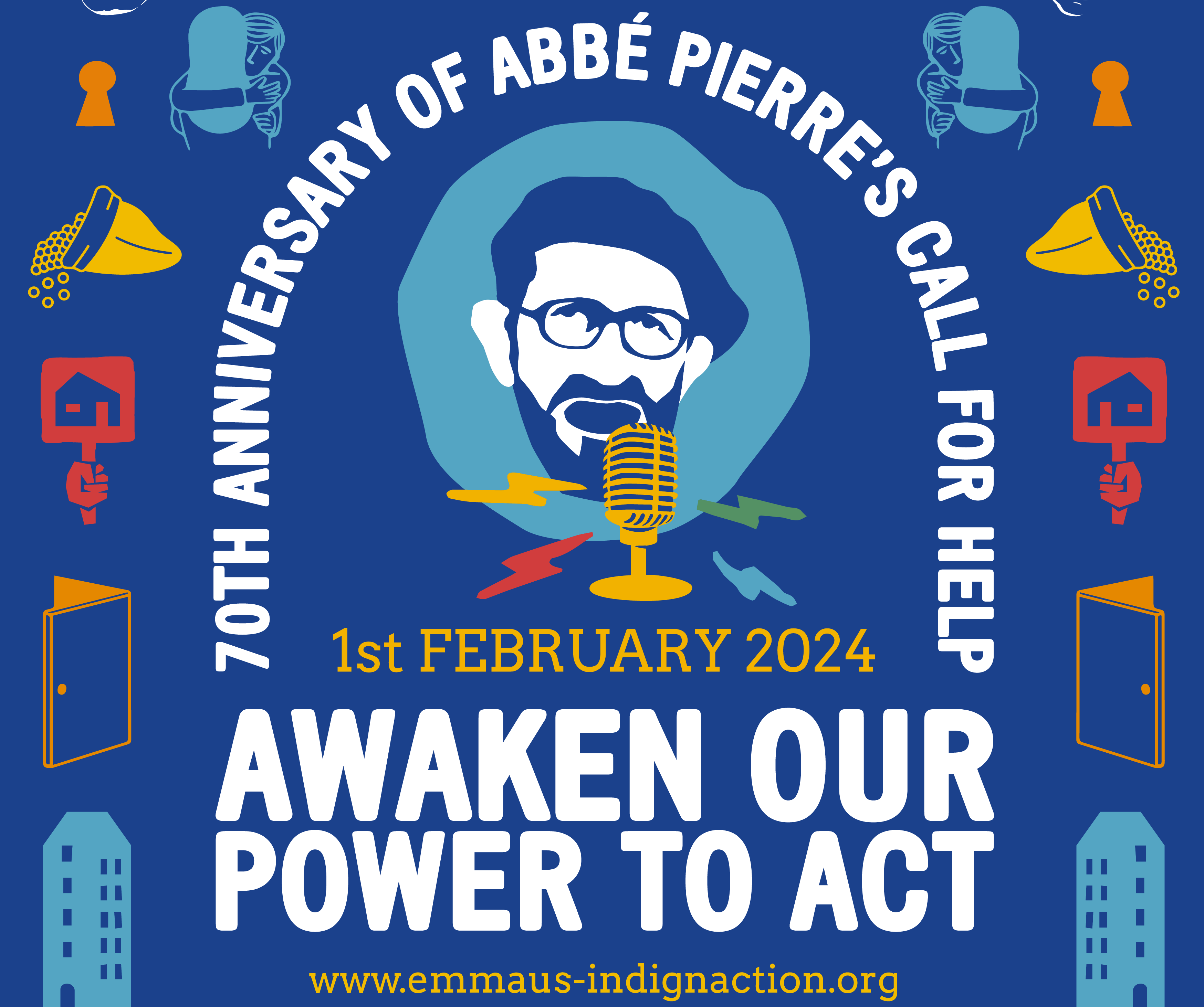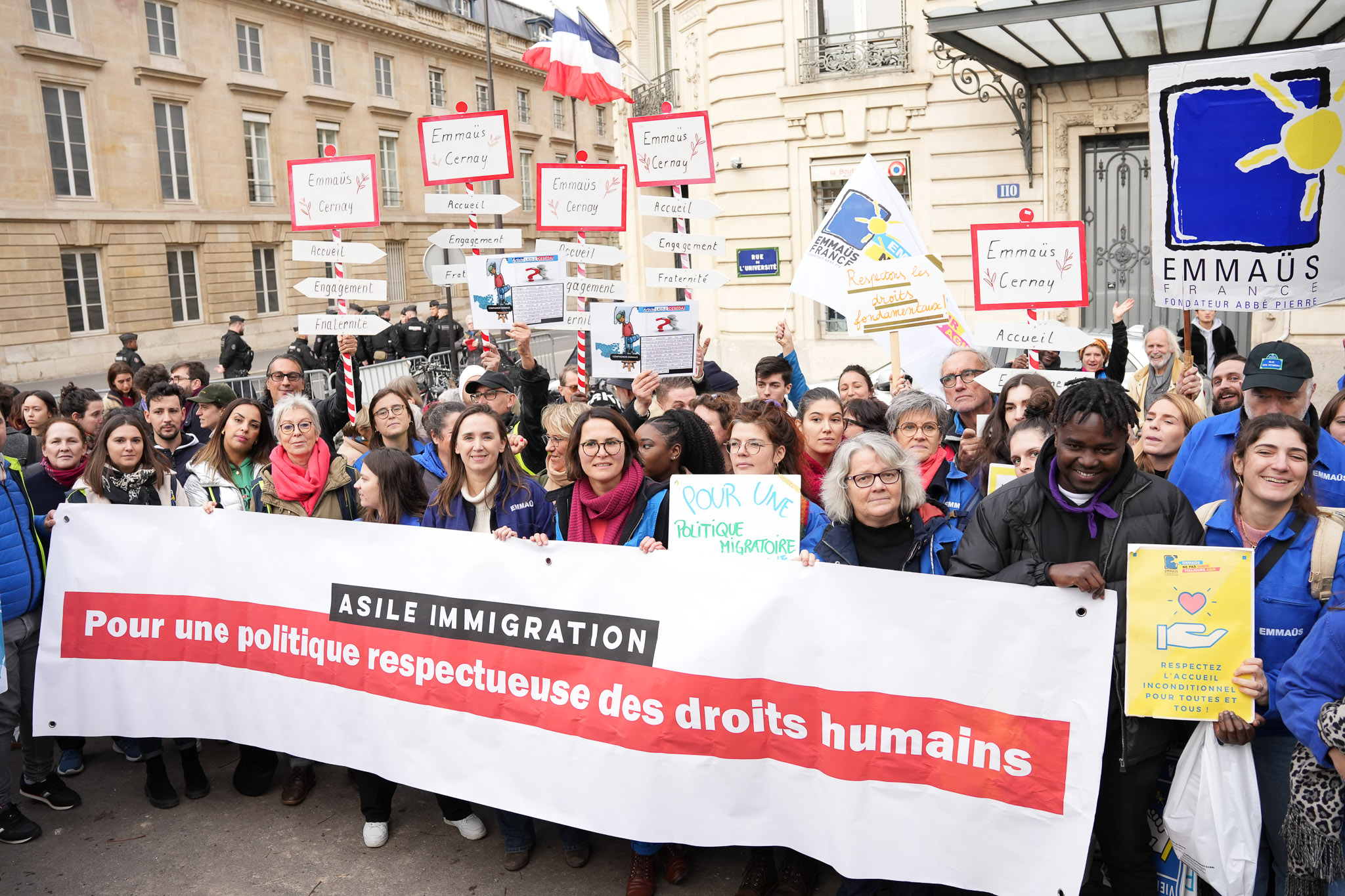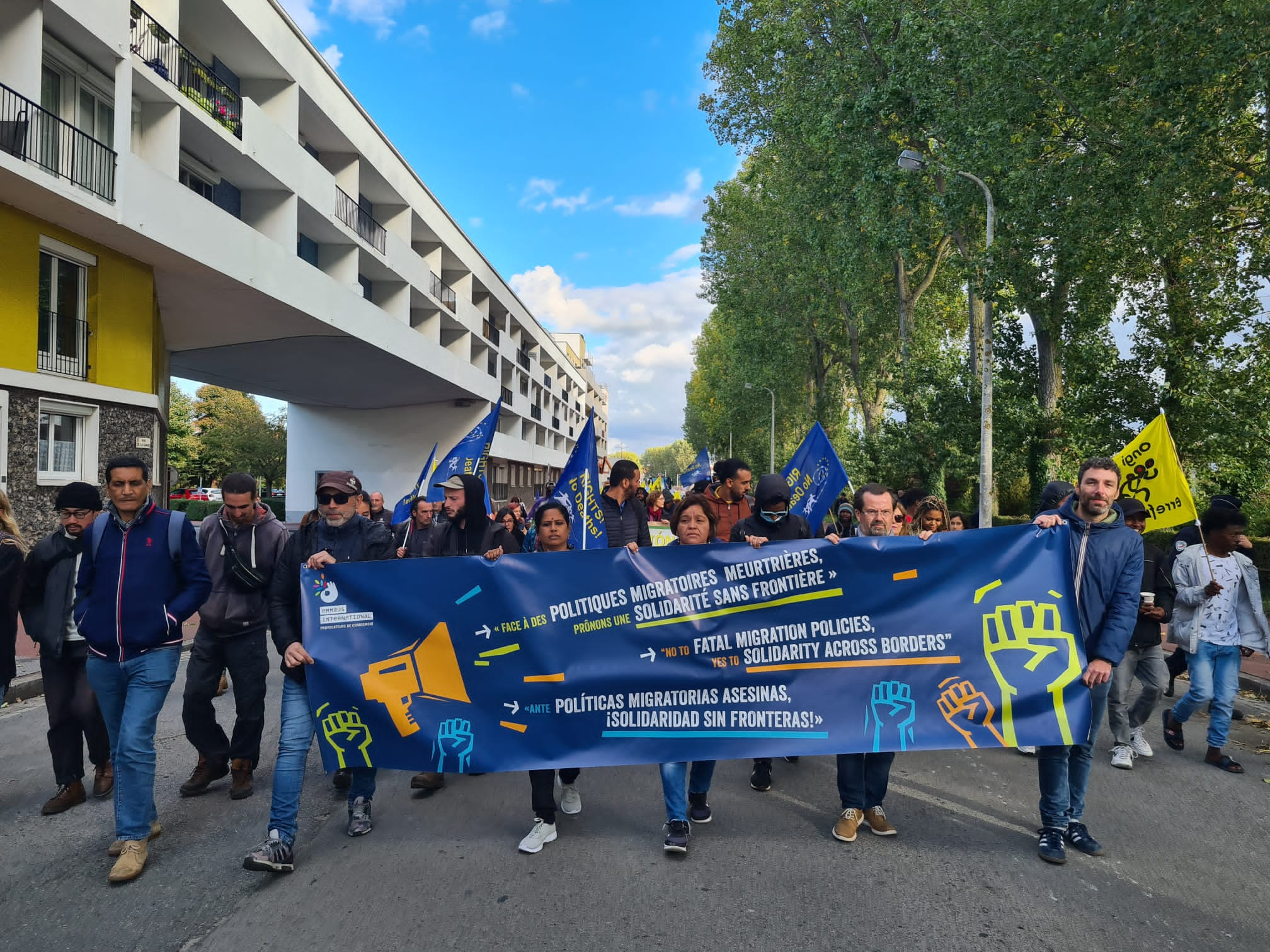2022 World Assembly: Presentation of the “Emmaus: Our Voices” report and closing of the assembly

José “Pepe” Mujica, Tarcila Rivera Zea and Olivier De Schutter shared their thoughts on the three requirements to overcome poverty as outlined in Emmaus’ first Global Report.
On Friday 13 May, the “Emmaus: Our Voices” report was presented at Montevideo City Hall to round off the programme of the last day of the Emmaus International 2022 World Assembly. This report outlines the struggles against poverty waged by Emmaus groups around the world. The panel was composed of the former president of Uruguay, José Mujica, the Quechua activist and president of the International Indigenous Women’s Forum, Tarcila Rivera Zea, in addition to the UN Special Rapporteur on extreme poverty and human rights, Olivier De Schutter, who joined the meeting remotely. This meeting was moderated by the well-known Uruguayan historian, Gerardo Caetano.
Before opening the panel discussion, Carolina Cosse, the Intendant of Montevideo, offered everyone a warm welcome. Cosse emphasised that for the country and the city of Montevideo, it was “an honour and a great source of joy” that Emmaus had decided to hold its assembly in Uruguay, as in a way Emmaus “stands for the staunch determination to fight for equality, justice and a better life” for all people. “Equality is, perhaps, the most important driving force of living democracies”, she stated, before adding, “You are welcome now and always. I wish you all the best, keep going and know you can count on Montevideo in your struggle for equality and justice.”
Following this, Patrick Atohoun, Chair of Emmaus International, took the floor, emphasising the high level of attendance at the assembly that was held for the first time in a Latin American country. This assembly gathered over 340 representatives from Emmaus groups from 34 different countries across four continents: three countries in Asia, seven in the Americas, nine in Africa and fifteen in Europe. Similarly, Atohoun welcomed the distinguished panel to the event and underscored the importance of the Global Report, published on 17 October 2021 on the International Day for the Eradication of Poverty, which gives a voice to people in extremely vulnerable situations, offers alternatives and outlines demands for overcoming poverty.
Three requirements to overcome poverty
To halt a deeply unequal system that is becoming more entrenched, devastating the planet, eroding democracy and generating violence in the world, the report sets out three requirements for a sustainable way out of poverty: “involving vulnerable people so that they can play a full part in society”, “placing the public interest at the heart of public policies” and “developing an economy that genuinely works for people and their environment.” The panel discussion focused on these three points.
“Many of us, since childhood, have known what Emmaus does in the world and in Uruguay. We know the type of society for which it has fought, it still fights and will continue to fight. The big issues on the global agenda are in this Global Report, they are issues that affect the whole world. This is the agenda for a better world, a different world which combines personal freedom and social justice, with a perspective that enables us to respond to all social problems”, Caetano stated as an introduction.
The first speaker was Pepe Mujica, who offered his thoughts on the three requirements set out by Emmaus and their meaning based on his personal experience. “I believe that the cause that you are fighting for with these three instructions is key”, he stated, adding “I would like to look at an individual question: why do we come into the world? Does life have meaning?”
Anecdotally, the former president of Uruguay told us that “a few years’ ago”, he asked a very rich man “when is it enough for you?” and the man answered, “I cannot stop”. Mujica explained that this was when he realised that in the world “making money is also a passion”. As a result, he started to look inward and question the meaning of life. “Human beings, whether consciously or not, need a cause in life and if someone doesn’t have a cause, the market creates one for you and you’ll spend your entire life paying taxes, confusing ‘being’ with ‘having’”, he explained.
“They say that a better world is possible, but I don’t know if it is. What I do know is that it is needed, it is crucial and these requirements outlined by Emmaus dignify human beings during these difficult times, when people are getting bored of making money and have now invented space tourism to look at the planet for four minutes, thousands of kilometres away, while an African woman walks kilometres for two buckets of water. How can this world not tell us something? That’s why I thank you for what you have done and what you are doing”, added Mujica.
“The voice of those who are voiceless should keep the powerful awake at night”, emphasises the Chair of Emmaus International in his opening words to the report. On this point, the Quechua activist, Tarcila Rivera Zea, has a lot of experience and she shared her story with us. “As the most excluded, we dream of finding our rightful place and of a world where diversity and differences do not separate us and where the wealth of our dialogue of knowledge, wisdom and forms of struggle are a reason for people to unite,” said Rivera Zea.
The Peruvian activist pointed out that there are around 480 million people in the world who are Indigenous peoples and in the Americas there are 55 million, of which around 27 million are Indigenous women, who suffer twofold discrimination: due to their ethnic and racial origin and due to their gender. “As Indigenous women, we do not want the states to regard us as mere objects that exist, but as subjects of rights, with the freedom to build our lives and choose what we want to do, who we want to be, when we want to be mothers or when we don’t”, she said.
Rivera Zea continued, highlighting that Indigenous women have defined the fight for “land and natural resources” as a priority within the defence of collective rights, as without this primary element “you can’t even begin to address the other aspects”. She also argued that Indigenous women have strong individual grievances related to the different forms of gender-based violence to which they are subjected within their communities. “Girls and boys younger than 12 are raped, girls are forced to give birth as a result of rape. Worldwide, Indigenous women are committed to eradicating all forms of collective and individual violence,” she affirmed.
For his part, the UN Special Rapporteur on extreme poverty and human rights reflected on how to develop solidarity and place the public interest at the heart of public policies. De Shutter highlighted that the points raised in Emmaus’ Global Report are a “fundamental” contribution to “shifting the focus of action and the fight against poverty”. Similarly, he argued that in order to place the public interest at the heart of public policies, we need to “create a truly inclusive economy with the focus on people and sustainability”, a far cry from policies centred on economic interests and for the benefit of the few.
The UN Special Rapporteur emphasised that governments’ lack of ability to create these types of policies is due to the interests of big business and the pressure on states, who end up adopting policies that favour these companies, to the detriment of living conditions for people in situations of extreme vulnerability.
Working together for equality and justice
Emmaus promotes the role of civil society in the defence of extremely vulnerable populations, faced by a capitalist system and a market establishing entrenched differences between rich and poor, stressed Caetano as an introduction to the second round of discussions. He asked the participants, “to illustrate the key, national and global role of social organisations and movements in fighting to create better societies.”
Once again, Mujica was the first speaker to take the floor. The former Uruguayan president centred his remarks on the role of politics to resolve differences in the living standards between the rich and the poor, establishing equality as a starting point for access to opportunities. “Politics has become debased, but it is essential as a concern that goes beyond political parties and definitions, because it relates to the fight for a fairer distribution in society”, Mujica explained.
The former president added that since time immemorial human beings have “moved in groups” and created communities, but that at the same time human beings are “individuals” because “nature makes us specific”. “Naturally, individuals clash due to their differences and this is where politics comes in to ensure that we have a shared roof over our heads”, he stated and then added, “there are always, and always will be, conflicts. Someone has to cushion these differences and that is the role of politics. This is why it matters how politics is exercised and for what purpose”.
Similarly, Mujica pointed out that political responsibility, “should not fall to people who aspire to live like the wealthiest and richest sectors of society because they end up thinking like them.” “We need to bear in mind the development of ideas, but also behaviour. In Latin America, there are polls that state that around 27% of Latin Americans agree with authoritarian governments and this is because democracy is losing its prestige, because politics falls to people who live in a way that disconnects them entirely from how ordinary people live”, he explained. Mujica emphasised that politics “is not a profession to get rich, rather it’s about having a passion for society”.
Furthermore, Rivera Zea added to Mujica’s comments the “responsibility of states when they gain power as representatives of the people”. “I wonder why power makes us so dizzy that we lose our bearings”, she stated and pointed out that the disappointment of people in democratic states is specifically due to “the poor exercise of the power granted to these leaders”.
Another important element for the activist is related to “raising awareness of the rights that every citizen should have” and according to Rivera Zea, here education plays a central role. “In the region there are countries where public education is not up to scratch to educate subjects with rights, rather than cultivating the idea that the state is God”, she stated, adding, “the content of the education system in our countries must change to generate new ways of being citizens and rights-holders”. “At the same time, these subjects must participate in realising the aspirations of the people, so that they come to power and don’t forget that we’re not alone and we must look at those around us”.
Furthermore, she highlighted that education is a key tool to educate individuals who are not dependent on state programmes aimed at poverty that see “the other as useless and only worthy of being given charity”. “Latin America is the most unequal region and also the most corrupt. The question is how to achieve change, where we should look, who we want to take this journey with”, she added.
At the end of the event, the Chair of Emmaus and the movement’s Chief Executive, Nathalie Péré-Marzano, thanked Mujica and Rivera Zea for taking part in the public event and gave them a resistance pin, recognition from Emmaus of their work as social stakeholders. After the speeches, there was an artistic performance by “La Maleza”, a female percussion group that defends diversity and human rights.
Closing of the World Assembly
This event concluded the World Assembly, during which the participants adopted resolutions and a final statement.
In the words of Patrick Atohoun, in a letter to all the movement’s groups, “the final statement should be appreciated and shared as it reflects our will to keep our heritage alive as a source of inspiration, both within and outside of our movement. We must make every effort to make the most of the opportunities we have to hold discussions within our movement, to involve each person and each member in implementing the resolutions adopted by a very large majority”.


